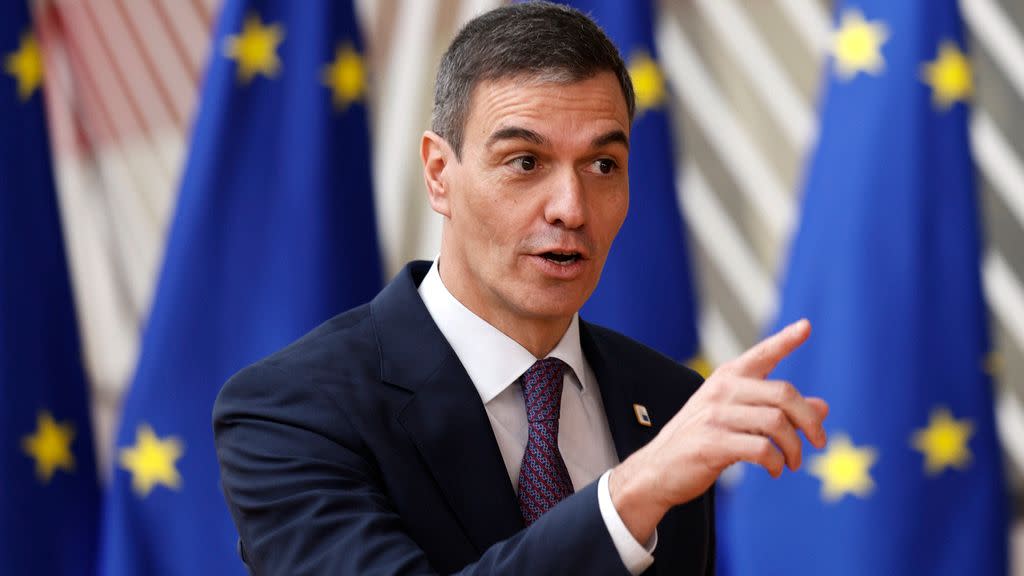Spain to recognise Palestinian state in 'historic' decision

Spanish Prime Minister Pedro Sánchez has celebrated his country's imminent move to recognise a Palestinian State, telling reporters the cabinet's expected approval of the decision is a "historic" event.
Spain is joining more than 140 countries around the world that are "ready to recognise" Palestine, he pointed out.
"The recognition of the state of Palestine is not only a matter of historical justice with the beginning of generations of Palestine people, but it is also an imperative needs to achieve real peace," he said.
Sánchez said the government's decision was aligned with UN Security Council resolutions 242 and 338 – which set guidelines for a land-for-peace formula – as well as Spain's position within the European Union.
It is "essential" Palestine finds its "adequate place in the international community", Sánchez said, adding this recognition does not mean that Spain is no longer an ally of Israel.
"The recognition of Palestine is not against anyone, least of all Israel, a friendly nation," he said.
In the announcement, Sánchez also condemned the actions of Hamas, describing the group as a "terrorist organisation" that stands against the two-state solution. Instead, the Spanish government said it would "support" the Palestine National Authority in the "reform process" initiated by its new government.
Sánchez said Spain will continue working with its Arab partners and international community committed towards peace and prosperity in the region, with the aim of making the two-state solution viable.
"With today's decision, we assume our responsibility in the search for peace, security and prosperity of all peoples in accordance with the mandate of the preamble of our national constitution," he said.
It comes as Ireland and Norway plan to make official their recognition of a Palestinian state on Tuesday.
'Unity of Europeans essential'
While dozens of countries have recognised a Palestinian state, none of the major Western powers has done so. It is unclear what concrete difference will be made by Ireland, Spain, and non-EU member Norway.
The recognition is nonetheless a significant accomplishment for the Palestinians, who believe it confers international legitimacy on their struggle.
Israeli Foreign Minister Israel Katz previously accused Spain of “rewarding terror” by recognising a Palestinian state. “No one will force us to convert our religion or threaten our existence. Those who harm us, we will harm in return,” he said.
Spanish Foreign Minister José Manuel Albares rejected the comments, saying his colleagues from Ireland and Norway were “also receiving absolutely unjustified and absolutely reprehensible provocations from our Israeli colleague” because of their plans to recognise Palestine.
"In the face of those who want to divide us with any type of intimidating propaganda, the unity of Europeans is essential to send a very powerful message," he said.
On Monday, Slovenia’s Prime Minister Robert Golob said his government would decide on the recognition of a Palestinian state on Thursday and then forward its decision to parliament for final approval.
Slovenia launched the recognition procedure earlier this month, and Golob has been under pressure to speed up the process since Spain, Norway, and Ireland announced they would proceed.
Timeline: Which countries have recognised Palestinian state? When and why?
With Charles Michel on his post-election future, Palestine and the far-right | Radio Schuman podcast
EU's foreign policy chief Josep Borrell threw his weight to support the International Criminal Court, whose prosecutor is seeking an arrest warrant against Israeli Prime Minister Benjamin Netanyahu and several other individuals, including leaders of Hamas.
“The prosecutor of the court has been strongly intimidated and accused of antisemitism – as always when anybody, anyone does something that Netanyahu’s government does not like," Borrell said.
“The word antisemitic, it's too heavy. It's too important.”


